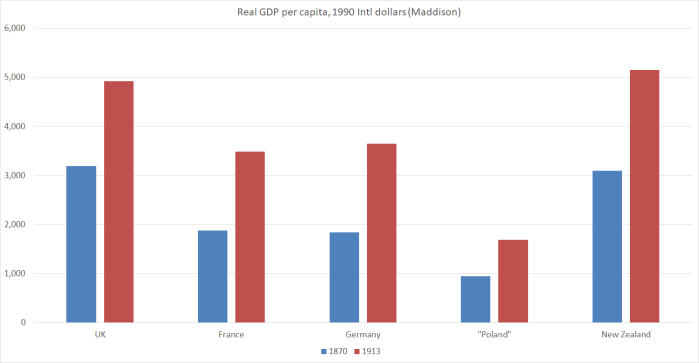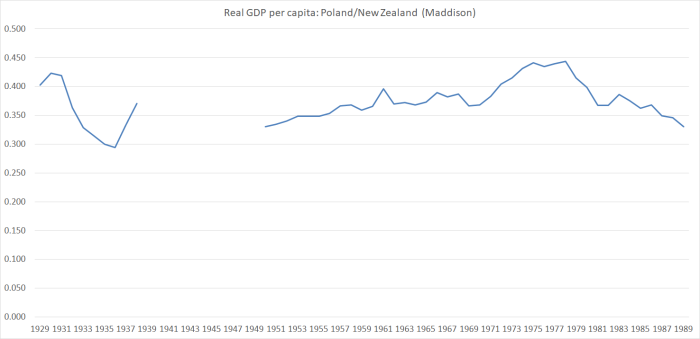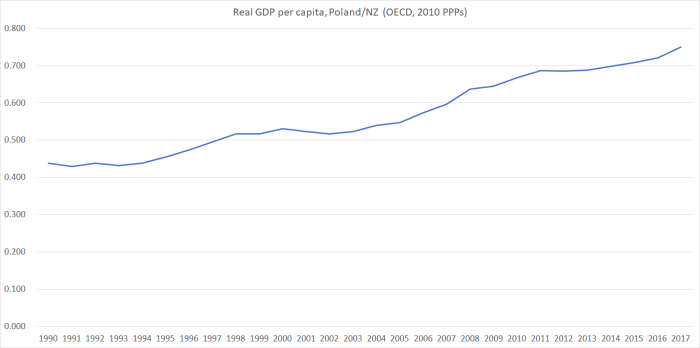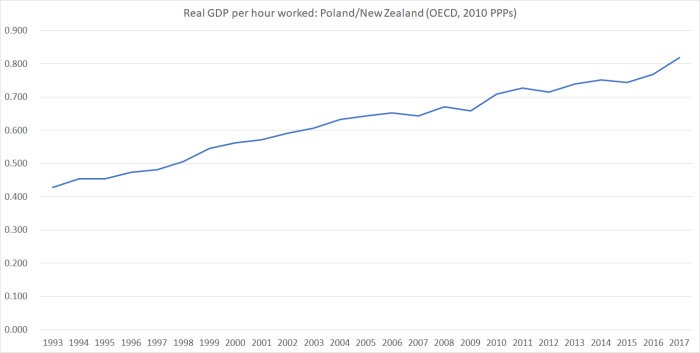Next week we mark the 100th anniversary of the end of World War One. Whatever else – good and ill – the resulting peace process ushered in, it led to the restoration of an independent Poland. I was reading an article the other day by a British writer, resident in Poland, reflecting on 100 years of (renewed) Polish independence, which in turn prompted me to dig out some economic data.
My own reflection on Poland is that it is hard to think of a place in the western world (say, present day EU, other bits of western Europe, and western European offshoots – eg New Zealand, Australia, Canada, US, Argentina, Chile, Uruguay) that wouldn’t have been preferable to live in over the last 100 years or so, at least as judged by material criteria. Perhaps if you were German, you have to live with the guilt of World War Two, but most of Germany was free again pretty quickly. Romanians and Bulgarians might have been poorer on average, but they largely escaped the worst horrors of the German occupation. To its credit, Bulgaria managed to largely save its Jewish population, while the Polish record was patchy at best. With borders pushed hither and yon, and not a few abuses of other peoples (notably ethnic German) post-war, sanctioned by the state, the place then settled into 40 years of Communist rule. There is a lot to admire about Poland, but I wouldn’t have wanted to live there any time in the 20th century.
In economic terms it has always been something of a laggard. Here from Angus Maddison’s collection of data are estimates of real GDP per capita for 1870 and 1913 for the UK, France, Germany, the territory that was Polish, and New Zealand.

Real GDP per capita in Polish territory (mostly ruled by Russia) was about a third of that in New Zealand.
The Maddison database has annual data for Poland from 1929 (excluding the period of the war), and that ratio of Polish GDP to New Zealand GDP seemed to show no real trend whether pre-war or in the communist years, averaging just a bit more than a third.

Relative prices – including the purchasing power parity exchange rates used- matter quite a lot in these cross-country comparisons across time. So not too much should ever be put on any particular levels estimate. The Maddison database only comes forward to 2008 and the most widely used current numbers are those from the OECD. On their calculations, at the end of communism Poland was a bit better off (say, relative to New Zealand) than in the Maddison numbers. Polish GDP per capita in 1990 is estimated to have been about 44 per cent of that in New Zealand.
Here are the OECD estimates for the period since.

On OECD estimates, Polish real GDP per capita hit 75 per cent of that in New Zealand.
Here is the OECD estimates for real GDP per hour worked (for which there are no longer-term historical estimates, but we can safely assume the ratio was very low on average – perhaps averaging 35 to 45 per cent – in the century prior to 1990. In 1993, when the Polish data start the ratio was 43 per cent – almost exactly the same as for real GDP per capita.

Last year, Poland’s labour productivty reached 82 per cent of that of New Zealand.
All of which is clearly very good for Poland. And it clearly isn’t just that they’d thrown off the shackles of communism: as the earlier charts show, Poland had been a laggard in the 19th century, and in the first half of the 20th century.
But, of course, part of the good news in these charts is a reflection of New Zealand’s own poor long-term performance.
Here are the latest OECD labour productivity (real GDP per hour worked) estimates for the same group of countries as in my first chart above.

Last year, for the first time, Polish real GDP per hour worked passed 50 per cent of that in France and Germany. 100 years ago, of course, both France and Germany would have lagged well behind both the UK and New Zealand.
Perhaps Poland will go on to achieve much greater convergence with the other big European economies in the next few decades – we can only hope so – and yet one can’t help wondering whether the leaders of a newly independent Poland wouldn’t have been rather disappointed if they’d been told that 100 years on their successors and fellow citizens would still be achieving only half the output per hour of the French and Germans.
Then again, they’d probably have been astonished to learn that 100 years on they’d be managing 82 per cent of average New Zealand productivity (and even 63 per cent of that of the British – leading global power a century ago).
Hard to think though how disbelieving our own leaders would have been 100 years ago if they were told how far we would have fallen relative to these other countries, notably including Poland. With none of the excuses – wars, shifting borders, genocide, or decades of communist rule.
I might have a look at the data for a few of the other post World War One emergent countries later in the month.
And what was different about nz then to what it is now. There is no diversity dividend in Poland.
LikeLike
Poles have a radical idea of travelling abroad, learning how things are done abroad, returning home having absorbed the best of what they experienced. So their living culture is continually imbibing new traits. Is that diversity or is it defined as traits we Kiwis are too dumb to learn.
For example Mexican cooking – https://www.nzherald.co.nz/business/news/article.cfm?c_id=3&objectid=12152589
Can’t resist saying it again – the definition of a skill is willingness to pay; if that restaurant is willing to pay its Mexican chef a salary similar to say Simon Gault’s annual earnings then INZ should issue a visa otherwise teach a Kiwi.
LikeLike
NZ & Poland – both countries have significant emigration of skilled workers. My anecdotally based forecast is for Poland to rapidly catch up with NZ. It is indicated by the way the graphs tilt up over the last couple of years and it makes sense – Polish tradesmen have made money in the UK and I guess are returning home and investing in Poland. They are not diluting their resources with rapid immigration.
Poland has one significant advantage – assuming you are a middle aged Pole with a seriously valuable skill, for example a gifted maths teacher or a doctor or an experienced high level social worker – moving to another country to work for higher reward requires learning another language. In NZ every equivalent skilled person knows they can earn more in Australia or the UK or Canada or USA – they only need a visa and a airline ticket. For Kiwis it is only their love of NZ and its lifestyle that keeps them here (I myself could be retired in the UK instead of NZ). Most Kiwis love NZ but I think our patriotism is mild compared to that of Poles (and Tongans).
So a modest bet – Poland to overtake NZ for GDP per capita by 2030.
PS. Aren’t those bar graphs showing NZ GPD compared with Germany and the UK embarrassing. I hope a few MPs are reading this.
LikeLike
You can hope for a few MPs to read this but there is still no clear answer as what they can do about it. An aging population requires an increasing number of carers. Older people are less productive which impacts the numerator and you need more carers which hits the denominator. I have suggested more incubation funding on robotic manufacturing but Michael argues our geographic isolation makes this option impractical. Just saying lower the migrant residency target still equates to high numbers of temporary workers. At some point after 3 or 4 years of being temporary workers in NZ, it seems rather harsh to send them packing home.
A Thai girl looks after my mum. She has been a temporary worker now for 3 years. Rather then return to Thailand she will now opt to marry a Russian IT professional with NZ residency.
LikeLike
Lets think clearly: an aging population does not need more carers – all it means is the carers are needed later in life. There is a growing need for carers but for two reasons that have little to do with age. Medical advances allow more to survive while seriously impaired – this applies to babies born severely handicapped as well as to the elederly striken by strokes that leave them disabled whereas in the past they would have died. The second reason is the tradition of the young and healthy looking after their ailing parents is breaking down. It will breakdown further as their are fewer children, more family breakups and more people changing countries.
I have just returned from hospital where my family member is being looked after by staff from NZ, Korea, India, China, Samoa – that is just this morning – obviously there are many other hospital staff originating from other countries that I didn’t meet today. There is no problem with immigrants working in our hospitals but only if they are not reducing the wages and not stiffling training of Kiwis. In the long run no country can just keep bringing in low paid workers forever – eventually the other countries get wealthier (will any English speaking Poles want to work in NZ when the Poland GDP per capita matches NZ?) and the supply will dry up and meanwhile all those new NZ residents will be getting older themselves and needing carers.
LikeLike
I did have a sit down and had a chat with this already 30 year old thai girl. Must say she is rather pretty. Given that I am officially separated, perhaps if she had asked I would have sacrificed myself being old and decrepit as her new husband. Anyway our new Russian IT professional got his residency within a year and being young and, IT professional and available trumped my old age.
But we did discuss her prospects as she was aiming for $80k, given that she is currently on minimum wage but with overtime hours she still manages to get a nice living wage of $52k on a 4 day week. Her plan is get married, get residency, go back to study occupational therapy and aim for $80k. I told her that a local kiwi self employed Occupational therapist can get upwards of $200k a year with the right connections with ACC and Social Welfare. I have met one Occupational Therapist who is earning $400k a year (it is also called legal corruption, can’t really believe how an Occupational Therapist by herself and her secretary can earn more than most doctors)
Somehow I think new migrants will still accept a lower pay than what kiwis would prefer to earn.
LikeLike
Older people use 42% of health services (they currently make up 15% of the population). Older people are also more likely to have a disability and to have more than one health condition.
Over the last 10 years, DHB spending on services for older people has increased twice as fast as their overall expenses (68% cf, 27%) and 5 times as fast as the consumer price index (CPI).
We expect the number of New Zealanders with dementia to rise from about 48,000 in 2011 to about 78,000 in 2026. Obesity is becoming more common and has long-term health and social impacts. Among New Zealand children as a whole, 10% are obese, but the rate is 30% in Pacific children.
New Zealand’s total health and disability spending is about $18 billion, or about 9.5% of gross domestic product (GDP).The Treasury estimates government health spending would rise from about 7% of GDP now, to about 11% of GDP in 2060
https://www.health.govt.nz/nz-health-statistics/health-statistics-and-data-sets/older-peoples-health-data-and-stats/dhb-spending-services-older-people
“an aging population does not need more carers”. Bob, every indication is that you are wrong. Old people need more carers. A very simple fact.
LikeLike
GGS – I admit it was a pedantic point. We need carers when we have bad health. Yes that does occur more frequently when we are old. But it is the health not the age that matters. Taking an economist’s ‘lets assume everyone needs 6 months care before they die’ starting point then according to the NZ Herald in Victorian times a Maori woman lived 23 years on average and in 2013 they lived over 77 years. Apply six months caring and one carer and you get 2.17% of the Victorian population as carers and 0.65% in 2013 (applicable to Maori women only since it helps make my point clear).
You answered my objection in one of your comments – it depends on how we look after ourselves. Obesity is a life choice that results in increased chance of cancer, heart attacks and dementia.
Caring is important; can’t think of anyone in my life I was more pleased to see than the MacMillan nurses who looked after my mother in Inverness from 10pm to 7am for the last 12 days of her life. There were ten different Scottish nurses and clearly all were at least fairly well paid. I know it was their job but their competance and dedication deeply impressed me. I find it sad that anyone looking after your mother or anyone’s mother is on the minimum wage. We are rapidly changing our country so low status low paid jobs are done by foreigners and I don’t like it (but have trouble explaining why).
I returned to visit the hospital at midday and found myself unavoidably over hearing a conversation that the 92 year old man in the next bed was having with a young medic. He has been fit and active for 92 years until now and the discussion was whether to have chemotherapy. A literal ‘to be or not to be’.
LikeLike
Bob, your Victorian example presupposes 6 months care before dying which is exactly a Victorian stats but these days in our modern era it is more like 10 years or more in care even in ill health. My mum is a prime example. 3 years ago she suffered a fall at age 85 and broke her back. She spent almost a year in surgery and recuperation surrounded by doctors and nurses. A year later she is home, bedridden requiring 8 groomers 4 times a day, with physiotherapist, doctors and nurses home visits. Another year later she has to go back into the spinal unit for 6 months for more physiotherapy and nurses care. She is now back home and can now stand but now requires a regular driver in a specialist wheelchair van to bring her from home to the doctors. She still requires grooming 4 times a day and getting stronger. 3 years of care and getting stronger.Technology keeps us alive much longer. The old and sick people are just not dying which equates to now a $18 billion industry which is the size of our 10 million cow industry.
LikeLike
Don’t forget your 92 year old likely was very unproductive since he retired 25 years ago. He would still go to the shops to buy food and buy clothing. He general day to day does generate GDP but very unproductive GDP.
LikeLike
Good post Bob
I forgot the UK is full of poles. Ironically kiwis are well traveled too.
LikeLike
There was an interesting paper recently on why some EE economies did much better than others, e.g. Poland v Ukraine. Too-rapid privatisation was a big negative for growth.
LikeLiked by 1 person
The massive adjustment with the end of the cold war/communism must have had a major impact on almost everything in Polandas well. Our Maori people are, apparently, still unable to adjust to colonisation over a hundred years later.
A good time perhaps, fifty years after the completion of Aleksandr Solzhenitsyn’s “The Gulag Archipelago ” to reflect on the lessons of the terrible twentieth century.
LikeLike
So you have been receiving similar communications about Maori incarceration rates. Ask 900 prisoners why they are in prison and prompt them with a reason that fits your own beliefs and you can get whatever result you like. Of course if you asked our Maori MPs why they are elected representatives who govern New Zealand you may also get the same answer – blame it on colonisation.
Sadly colonisation whatever its effects gives the do-gooders an easy out when their efforts make no difference to our prisons. Asking them to concentrate on something they have some control over such as reoffending and literacy, job-training, home ownership would help.
National Party [8]
2. Paula Bennett – Upper Harbour (Waikato)
6. Simon Bridges – Tauranga (Ngāti Maniapoto)
27. Jami-lee Ross – Botany (Ngāti Porou)
36. Joanne Hayes – List (Ngāti Porou, Ati Haunui A Paparangi, Rangitāne ki Wairarapa)
42. Nuk Korako – Port Hills (Ngāi Tahu, Kati Mamoe, Waitaha, Rapawai)
45. Shane Reti – Whangarei
54. Adrienne Pierce – Palmerston North
62. Harete Hipango – Whanganui
Labour Party [13]
2. Kelvin Davis – Te Tai Tokerau (Ngāti Hine)
17. Willow-Jean Prime – Northland (Ngāti Hine, Ngāpuhi)
21. Kiritapu Allan – East Coast (Ngāti Ranginui, Ngāi Te Rangi, Tūwharetoa)
22. Willie Jackson – List (Ngāti Porou, Ngāti Maniapoto)
26. Louisa Wall – Manurewa (Ngāti Hineuru)
29. Jo Luxton – Rangitata
34. Paul Eagle – Rongotai
– including remaining Māori Electorate MPs:
Peeni Henare – Tāmaki Makaurau (Ngāti Hine)
Nanaia Mahuta – Hauraki-Waikato (Ngāti Te Ata, Waikato)
Tamati Coffey – Waiariki
Adrian Rurawhe – Te Tai Hauāuru
Meka Whaitiri – Ikaroa-Rāwhiti (Rongowhakaata, Ngāi Tāmanuhiri, Ngāti Kahungunu)
Rino Tirikatene – Te Tai Tonga (Kai Tahu, Ngāti Hine)
New Zealand First [6]
1. Winston Peters – Northland (Ngāti Wai)
2. Ron Mark – Wairarapa (Ngāti Raukawa, Te Arawa, Tūwharetoa, Ati Awa, Ngāti Porou, Whakatōhea, Ngāti Kahungunu ki Wairarapa)
3. Tracey Martin – Rodney (Ngāti Kahungunu ki Heretaunga – iwi whāngai)
4. Fletcher Tabuteau – Rotorua (Ngāti Ngararanui, Ngāti Rangiwewehi, Ngāti Whakaue)
8. Shane Jones – Whangarei (Te Aupōuri, Ngāi Takoto, Ngāti Kahu)
9. Jenny Marcroft – Tāmaki (Ngāpuhi, Ngāti Wai, Hokianga)
Green Party [1]
2. Marama Davidson (Ngāti Porou, Ngāpuhi, Te Rarawa)
ACT Party [1]
1. David Seymour (Ngāti Rēhia)
LikeLike
Thanks Bob, I don’t want to hi-jack the thread but I introduced Solzhenitsyn to point towards the result of acceptance of the convenient half truth and how that leads to forced submission to the Big Lie and the unimaginable horrors of the death camps.
We are well down that road when we vilify opinion and shut down discussion; that is happening. In the UK comedians now risk prison.
LikeLike
Sorry, go to 1.33.20 for the start of the relevant part.
LikeLike
David, I am liberal about prison reform. So are a group called ‘ActionStation’ and they have made the effort to produce a report on it that they have sent me several emails about and it has been reported in the media – for example https://www.nzherald.co.nz/nz/news/article.cfm?c_id=1&objectid=12136805&utm_source=actionstation&utm_medium=email&utm_campaign=blast2018-10-16
Philosophically I am instinctively against any way in which the govt restricts freedom which doesn’t mean it shouldn’t (for example which side of the road we drive and speed limits) so I worry about prisons.
I want to see fewer prisoners. Not a view that may be shared by victims of crime but the argument being prisons cost money and cause misery to prisoners and their families and are just a great lost opportunity for adults to pursue happiness and contribute to society. Finding alternatives to prison and investigating the causes of crime is important. So I have little trouble with an analysis that says ‘solve Maori crime rates and the problem is halved so lets use a Maori solution’. However it does seem as if all they are doing is making Maoris into victims. Blaming colonisation is like blaming Eve for eating the apple and causing original sin. I wish them well but remain concerned that they have given themselves what might be called ‘a get out of Jail card’ if/when their efforts fail.
I suppose I’ve hi-jacked the thread too and with less justification than you.
LikeLike
I’m not up with prison reform Bob but found agreement with this letter/essay from Ward Kamo on crime and colonisation, published recently in one of our local papers; the Northland Age.
“I know first-hand the brutal lives of many Maori criminals and I know that too many of them have been victims of crime, neglect, and violence in their childhood. These root causes have been generations in the making, and no one government can be blamed.
But to focus on prisons as being the problem for Maori borders on absurd. To suggest less prison equals less crime is preposterous. The problem is the victimisation of Maori by our own.
Prisons provide welcome relief for those brutalised by their loved ones on a daily basis — they serve these victims of crime. They may also be a place where we can begin the long road to addressing the issues that led to time behind bars — but I doubt that. If they did we wouldn’t need them.”
https://www.nzherald.co.nz/northland-age/news/article.cfm?c_id=1503402&objectid=12140702
LikeLike
Looks like you can take Simon Bridges and Paula Bennet off soon if Jami lee Ross keeps leaking his taped conversations to Duncan Garner, also Maori, on TV 3. Also at this rate of illegal taped private conversations you would have thought the police would have charged Jami by now. So that’s 3 down. 15% of a minority ethnic population seems rather over represented in Parliament. Good thing Maori are too busy backstabbing each other.
LikeLike
Interesting article but to state Poland’s treatment of the Jewish people was a bit patchy at best is despicable when 90% of Poland ‘s Jewish population of 3 million were brutally murdered along with nearly 3 million other Jewish people on Polish soil.
LikeLike
It would be useful to add here that notwithstanding often less than ideal treatment of Polish-Jewish minority, the extermination of pre-war Jewish population of Poland was NOT perpetrated by the agencies of Polish state.
LikeLike
Indeed. The mass murder of millions of Polish (and other) Jews was the responsibility for the German invaders/occupiers.
My reference was mostly to the pretty appalling incidents post-war when some of the few remaining Polish Jews sought to return home. Pre-war anti-Semitism was also, as in many places, something real.
LikeLike
The Polish government was in the UK? The Poles were generally with a few amazing exceptions keen helpers for the Germans otherwise the survival rate would be higher as in Denmark and France.
LikeLike